Religious Litter Fueling Viral Atheist Activist Movement
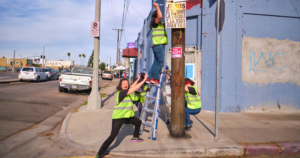
One person’s trash is another’s treasure.
In this case, the trash is illegally-hung signage shouting slogans like “Jesus or Hell” or “Jesus is King! Except it!” The treasure hunters are atheist activists with a mission to rid the world of proselytizing trash hung unconstitutionally on public property. In a short time, they’ve turned a small club for tracking and removing religious litter into a fast-growing activist network closing in on 100 members across the country.
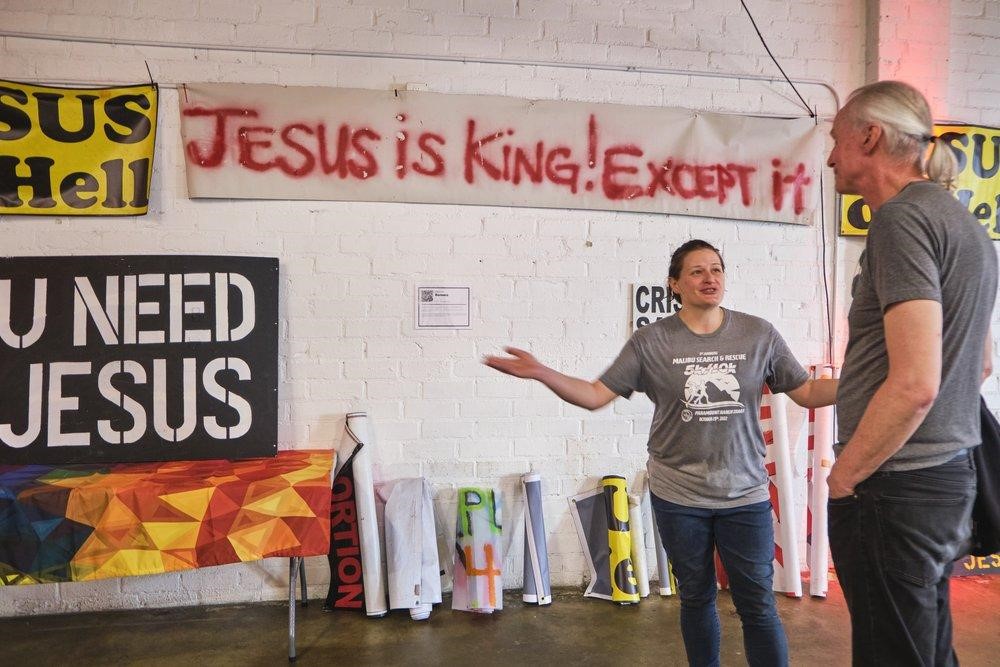
Various religious signs on display at Atheist Street Pirates’ 2023 Art Exhibit & Party
The Atheist Street Pirates is a program of L.A.-based Atheists United, a regional affiliate of the American Humanist Association. A motley team of volunteer “pirates” first launched the program by building an interactive map to track illegal religious signage in Los Angeles, mostly found on telephone poles and highway overpasses. Eventually, they began cleaning the streets themselves, attracting worldwide media attention.
This time last year, they were boasting nearly 500 signs removed since 2021. An Art Exhibit & Party in L.A. highlighting their work drew almost 100 guests, received local and national press, and raised over $2,500 for Atheists United programs.
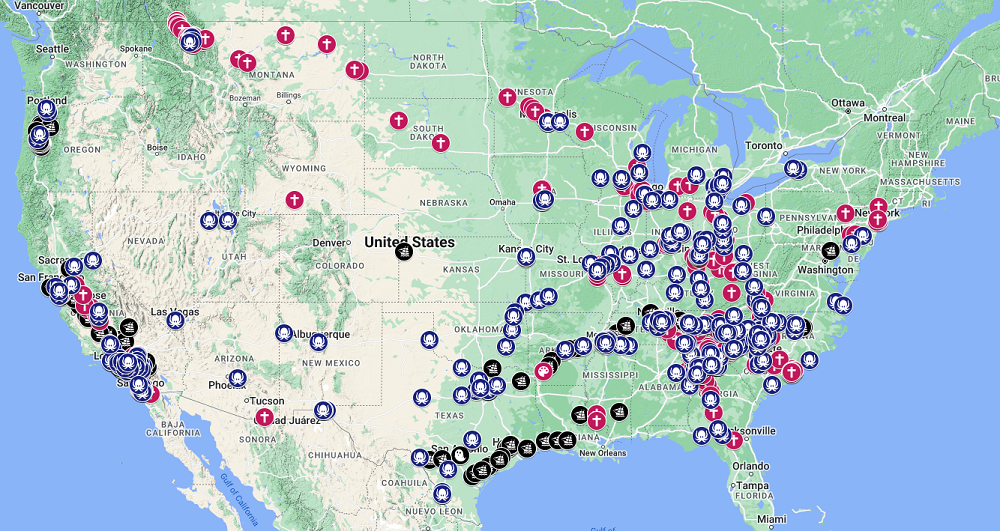
Snapshot of Street Pirates’ map, showing locations of religious signs reported by Pirates in thirty states.
Just one year later, the Street Pirates program—which originally encompassed only the LA area—has expanded across the U.S., with Pirate volunteers reporting and removing religious litter in thirty U.S. states. Since last year, the number of plundered religious signs has skyrocketed to over 2,000.
Atheist Street Pirates’ map of reported signage now includes over 4,000 pins. It encompasses Southern California and shows big clusters of activity throughout the religious Midwest and South, tapering off along the east coast through New York. There are even a few pins in Ireland, the U.K., and France.
The program’s appeal has also now broadened, even garnering excitement from religious leaders. In New York City, Street Pirates established relationships with city hall to report religious litter for quick removal, finding the city welcomed (and needed) help to pinpoint it. Street Pirates say this is important, as the vast majority of the country rejects Christian nationalism.
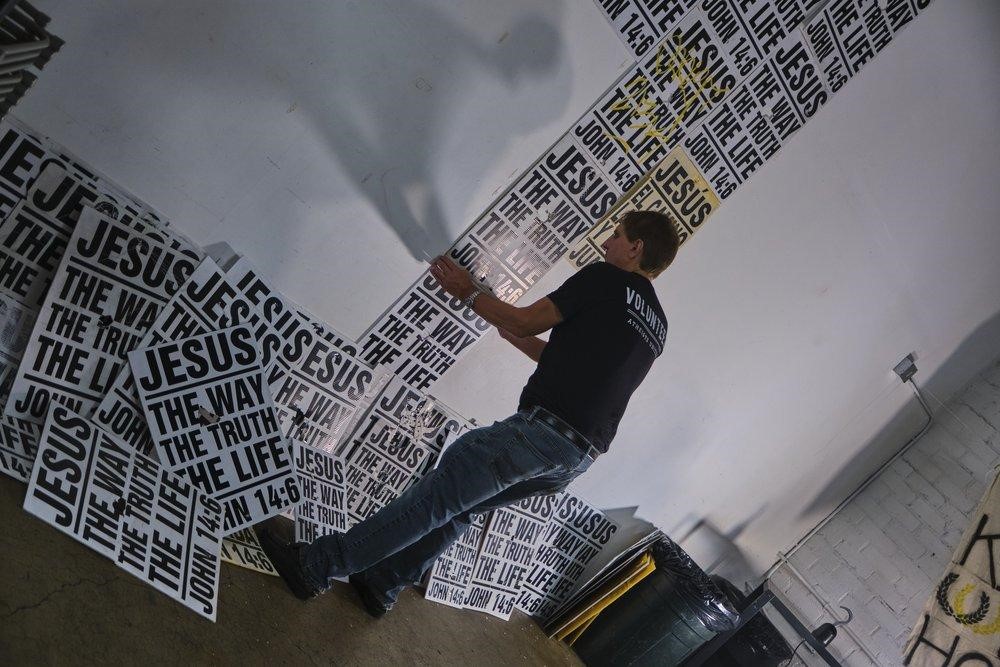
An Atheists United member assembles plundered signs for an art installation. (Photo: Atheists United)
Atheists United Executive Director Evan Clark says he sees his organization as a lab for determining how atheist communities are best built. He thinks the rapid spread of Street Pirates is a big discovery, using humor, creativity, and camaraderie to excite new activists.
A crew of online volunteers has even begun tracking a few notorious religious scallywags, such as the Jesus Saves Gang founded by North Carolina-based Christian street evangelist Brent Farley. Their banana yellow “Jesus Saves” signs (which Farley sells alongside anti-LGBTQ+ slogans) were famously scattered among the January 6th insurrectionists in 2020 and have since been found illegally posted in over thirty-two states, making up over a third of all signs discovered by the pirates.
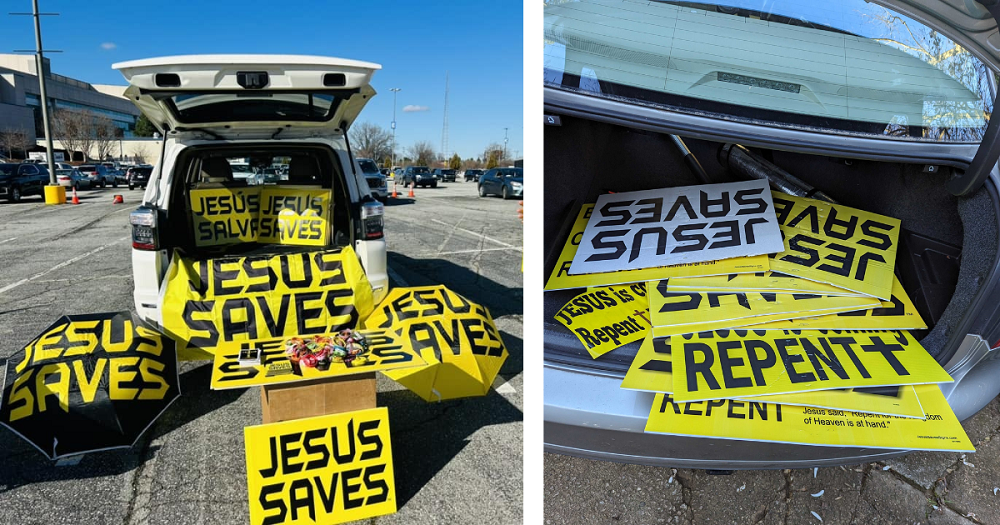
“Jesus Saves Gang” signs for sale at a Trump rally (left), juxtaposed with a trunkful of the same signs after being cleaned up from public streets nearby by a Street Pirates volunteer. (Photo: Captain Graybeard)
The Street Pirates view many of the signs they remove as a form of micro-aggression by Christian nationalist groups.
“We wouldn’t tolerate this kind of bullying against other groups,” says Street Pirate’s Texas-based Map Master, who goes by the handle Captain Graybeard. “How would people react to a sign proclaiming that being straight or cisgender or that white power is ‘the way’? Essentially, that is the coded messaging behind most of these signs.”
“The beauty is it’s getting atheists connected doing work that feels empowering in places where we don’t have a lot of power,” he continues. “And the Pirates assign themselves serious labor. One guy drove 300 miles the other day to collect thirty-seven signs all over the rural Midwest. It’s real work to take them down.”
When surveyed, most Street Pirates said they joined out of a sense of concern over growing Christian nationalism, as well as overall frustration with religion being foisted upon them in the public square. One member in Georgia felt their work kicked into high gear when they saw proselytizing signs on a fence at their public school.
“The rise of theoretically fascist propaganda is scary to witness,” said a Los Angeles member. “I don’t have money to donate to anyone but I can take down signs.”
Many talk about the catharsis they experience when plundering signs, often driven by having had intense religious trauma earlier in life.
“It can be frustrating that so much religiosity has infected our popular culture, and more worrisome, our government,” says a Los Angeles Pirate nicknamed Captain Blackheart Salty Seas. She says it’s “enormously satisfying” to take down signs and metal crosses. “”It feels like I actually get to make a little bit of religion go away.”
For many members, Pirates is their entry point to secular activism.
“Being accepted was a rush,” said a Pirate identifying as Faithless Wonderboy. “Taking my first sign was an exciting small step toward retaking our public spaces in the name of secularism.”
Executive Director Clark says while it’s not the group’s primary objective, the nature of the work contributes to a network of atheists that receive useful experience in grassroots action.
Street Pirates activists employ digital and on-the-ground ingenuity to track and eliminate signs. Many are high atop telephone poles attached with roof nails, others above freeway overpasses tied down with cable. Pirates work with local code enforcement departments if a sign is located somewhere too dangerous for a volunteer to plunder it.
This was the case in New York City recently, where Street Pirates found City Hall welcomed Street Pirate maps of “Messiah is Here” stickers that had become a common nuisance on lamp posts and the like. It turned out the City was fed up with them too—the only thing inhibiting their removal en masse was lack of data as to where to find them.
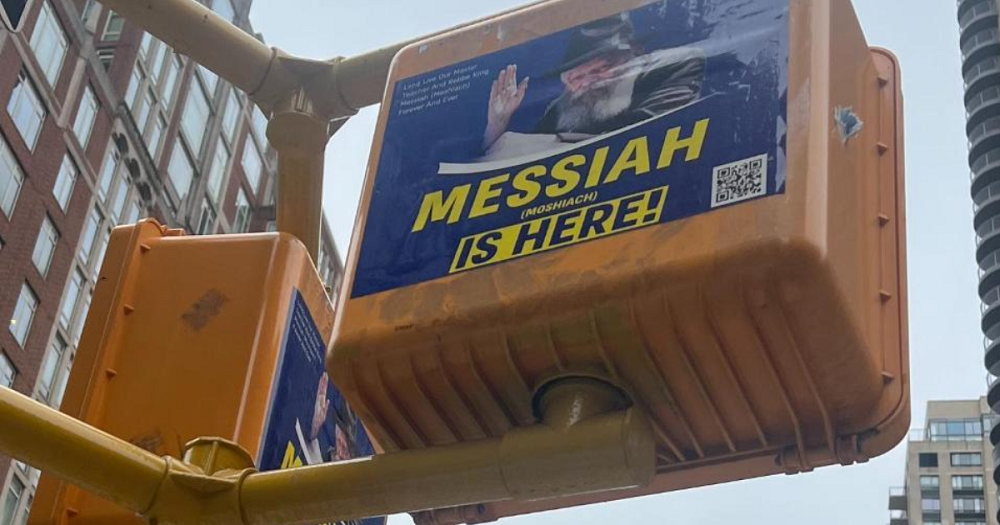
“Messiah is Here” stickers ubiquitous in Brooklyn and Manhattan
Clark says all this experience makes for secular activists who are better equipped to organize on things like legislative issues, should they choose.
“It’s ironic,” says Clark, “that the people who put these signs up to bully and shame anyone who isn’t a Christian supremacist are actually helping atheists organize and stand up for separation of church and state.”
Atheist Street Pirates will celebrate their 2,000-sign milestone at their second Art Exhibit and Party on April 28th. In a warehouse typically used to shoot music videos, attendees will sip mimosas and mingle among some of the hundreds of signs AU has accumulated, some of which will be turned into unique works of art. Attendees will be able to bid on the artwork and make their own out of the plunders.
Funds raised will benefit AU’s programs, including its charitable food giveaway and scholarships to secular students.
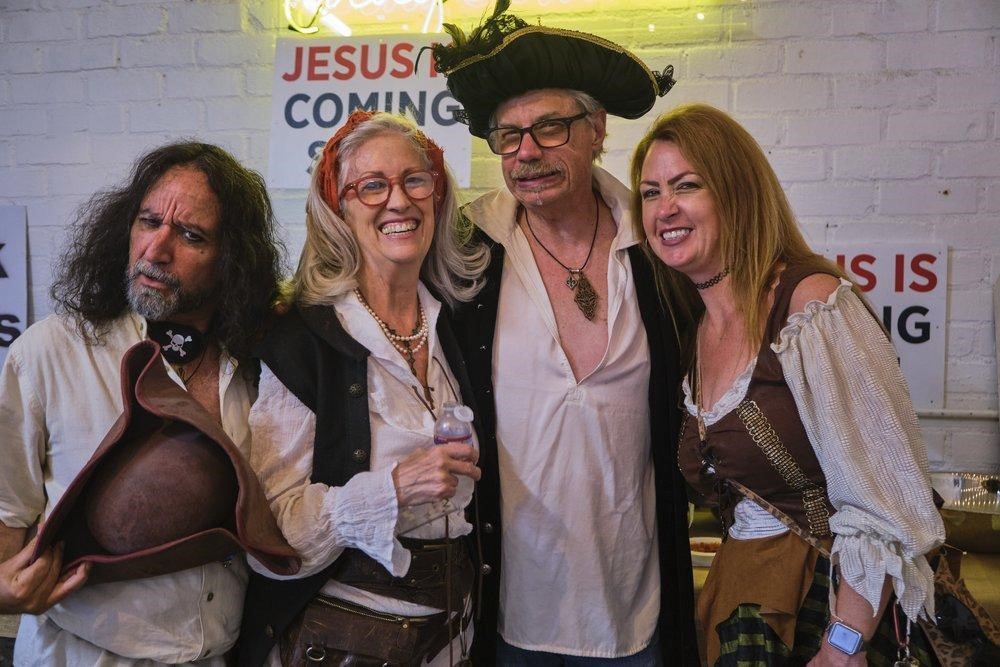
Atheist Street Pirates cosplaying during 2023’s Art Exhibit & Party (Photo: Atheists United)
“Social events like this are also how we build a sustainable movement,” says Clark. “Burnout is real in the separation of church and state movement. Obviously there are bigger things to worry about than Jesus signs on a telephone pole. But this work, both the program and these parties we put up that get amazing PR for atheists, these things recharge activists’ batteries for the bigger fights. It’s good to have something we can make an immediate impact on and actually have fun doing it.”
You can report a religious sign anywhere in the country at atheistsunited.org/streetpirates
